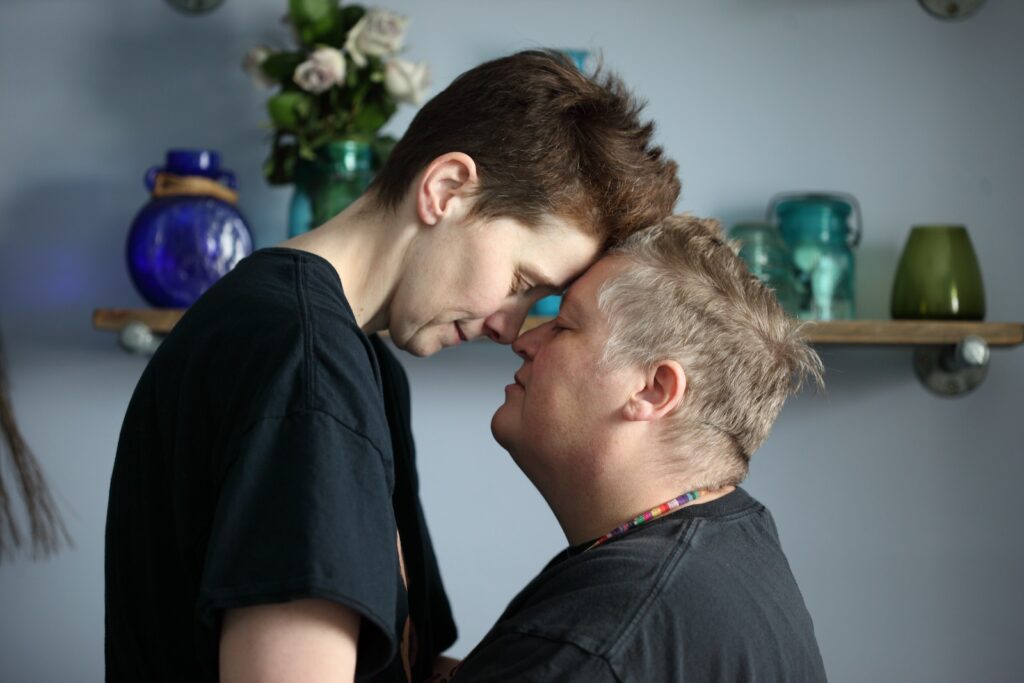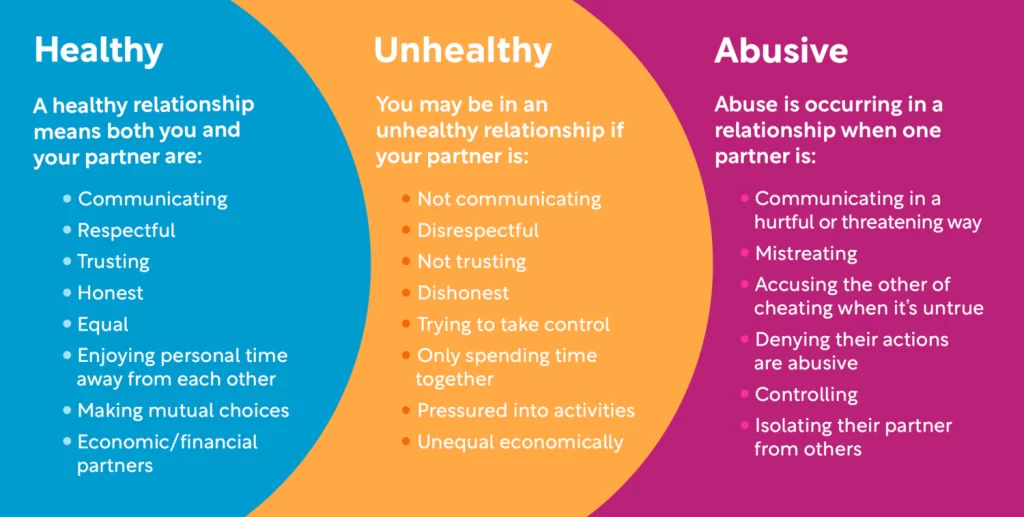
Nourishing relationships helps you feel good about yourself and makes life fun. How do we know what makes a relationship healthy?
Healthy Relationships
In general, healthy relationships allow for both partners to feel connected and supported, while maintaining their independence and ability to make decisions about themselves and their relationships. Healthy relationships involve honesty, trust, respect, and open communication between partners.
Having a healthy relationship involves compromise from both people in a way that does not compromise dignity or respect for each other. Ultimately, partners decide together what defines healthy for both involved. Think of the nature of your relationship and see how you feel about it as you read the following ingredients of a healthy relationship.
What does a healthy relationship look like?
Your relationship is healthy if both partners:
- Speak openly and honestly about thoughts and feelings
- Trust each other and don’t require their partner to “check in”
- Respect each other’s separate thoughts, feelings, friends, and activities
- Listen to each other and compromise
- Resolve conflicts safely and respectfully
- Take personal responsibility
- Respect each other’s need for privacy
- Share information and responsibility
- Communicate openly and honestly about money
- Do not try to control or change each other
- Feel safe with each other emotionally and physically
- Share sexual health status and practice safer sex methods as is comfortable and agreed upon by both parties
- Respect each other’s sexual boundaries
- Are flexible and allow for changes in behaviors
- Celebrate each other’s success
- Value each other’s opinions
- Ask for what they want and respect the answer
- Trust each other; don’t accuse each other of cheating
- Encourage and do not criticize each other
- Make important decisions together
- Share common interests and activities
- Participate in activities independently
- View commitment as an active choice
- Grow and change without feeling threatened
For more information on the difference between healthy, unhealthy, and abusive relationships, consider reviewing Love Is Respect’s Relationship Spectrum.

How can my partner and I communicate better?
Communication
One of the most important aspects of a healthy relationship is good communication. When partners communicate well, they are able to listen to each other and talk about themselves easily. The following tips are some ways to improve communication in your relationship:
Share and listen. In a healthy relationship, you feel comfortable sharing the good and bad with your partner. You’re able to listen to the positive and difficult things your partner shares without judgment.
Be caring and supportive. People in healthy relationships build each other up and help each other feel better. Be there for your partner when they need you and let them do the same for you.
Be respectful. Ask for what you need, but remember to respect your partner. Show them that you value their thoughts and feelings.
Cooperate. Disagreements happen in every relationship. Working through problems together often makes healthy relationships stronger. If you can’t find agreement, find a way to work together on a compromise. If each person gives a little, both end up feeling respected.
Balance time together and away. Healthy relationships require space. It’s okay to have time for yourself and private aspects of your life that you don’t share with anyone else.
What are boundaries and how can they help me?
In healthy relationships, each person is able to tell their partner what makes them comfortable or uncomfortable and have this respected. Boundaries aren’t meant to shut out your partner or make either of you feel less intimacy, and creating boundaries doesn’t mean you don’t trust each other. By setting boundaries together about time, your sex life, finances, family, friends, and personal space, you and your partner can have a better understanding of what makes you happy in a relationship.
Healthy boundaries allow you to:
- Feel emotionally and physically safe
- Spend time alone with your friends and family
- Have private technology and phone passwords
- Enjoy separate activities and hobbies
- Respect each other’s opinions and needs
Boundaries help keep your relationship healthy and comfortable. Building boundaries is important in healthy relationships.
How can I communicate about difficult issues with my partner?
Disagreements happen in all relationships. It’s helpful to know how to approach your partner when you’re upset and need to talk about something important. The following techniques may be helpful. You know your relationship best. If you’re in an unhealthy or abusive relationship and you think any of these would put you in danger, don’t try them.
For important talks, try to:
Stop and take a deep breath. If you get really angry about something, stop, take a step back, and breathe. Give yourself time to calm down. Taking a break can keep the situation from getting worse.
Find the right time. When it comes to discussing issues, timing is everything. It’s hard to listen well when your favorite show is on. And no one wants to have a heavy talk when they’re stressed about something or sleepy. Let your partner know you would like to have a conversation with them and select a time that works well for the both of you. Find a time when you have privacy and neither of you are doing anything important.
Talk face to face. Text messages, letters, and emails can be easily misunderstood. It’s best to avoid talking about serious matters in writing. Speak in person to be sure each person is able to clearly communicate their thoughts and feelings.
Be calm and respectful. When you stay calm and respectful, your partner is more likely to understand what’s really upsetting you. Yelling, “You’re always distant with me…” can sound like an attack, which can make your partner defensive and less receptive to your message. Instead, try using “I” or “we.” For example, say “I feel like we haven’t been as close lately,” or “I’d like it if we went out together more often,” instead.
Be honest. Tell the truth, but be gentle. Share your feelings honestly without blaming the other person. Admit your own mistakes and apologize.
Show you’re listening. Good body language shows you really care. Don’t take a phone call, text, or play a video game when you’re talking. Nod and respond to show you understand.
Use the 48-hour rule. If you don’t speak up about what’s bothering you, there is no way for your partner to apologize or change. But you don’t have to say something right away. Let some time pass to get calm and gather your thoughts. If you’re still hurt 48 hours later, bring it up. You’re likely to have greater understanding about how you feel and communicate more effectively to your partner.
At first, some of these tips may feel unnatural or awkward. Stay with it. It takes time and determination to keep your relationships healthy, but it’s worth the effort.
Are You in An Unhealthy Relationship? Reach Out
Call the Minnesota Day One Crisis Line 1-866-223-1111 to speak with an advocate (interpreters are available), text 612-399-9995, or click the CHAT NOW button on this site to connect with a Day One advocate. A Day One advocate is available 24 hours a day, 7 days a week to assist you.
If you are in immediate danger, call 911.
